Well, it’s finally here. Xiaomi’s flagship smartphone, the Mi 9T Pro has launched in the Philippines. It’s the global version of the Redmi K20 Pro for the Chinese market and features a 6.39-inch AMOLED screen, Snapdragon 855 chipset, and triple rear cameras. Although we had reviewed the K20 Pro a few months ago, we’re going to test the Mi 9T Pro to see if there are any differences.

Note: Since the Redmi K20 Pro and Xiaomi Mi 9T Pro are identical in specs, parts of our review of the former will be carried over to this review. What’s new in this review are the product shots, camera samples, observation on software, performance, benchmarks, camera, battery life, and conclusion.
Table of Contents
For the design, it’s surely a combination of form and function, but it is missing a few things. It’s a pretty hefty phone. It’s got a huge screen, and it’s relatively thick, so do expect a bit of a bulge in your pants.
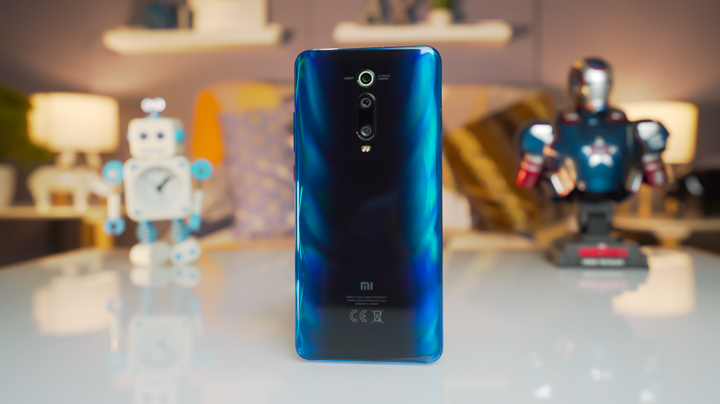
The back panel sports 3D curved gradient glass that looks cool, by the way. In addition to the Flame Red and Glacier Blue, Xiaomi is also bringing the Carbon Black and Pearl White models. Also note the lack of a fingerprint scanner here, because we have an in-display fingerprint scanner.
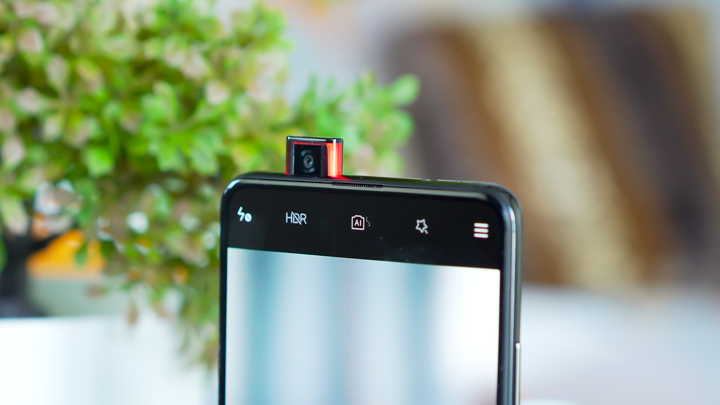
And of course, we get the amazing bezel-less look thanks to the pop-up selfie camera. It does make a sound when it’s activated, and it has LEDs, so everyone around you knows you’re taking a selfie. What’s cool about it though is that it doubles as an LED notification light, so if you’re into that, big points for the function. The device can also detect when it has been dropped, so if you happen to drop it and the selfie camera is out, it will automatically retract.

You get a USB-C port and a headphone jack, however, the headphone jack is on top, which I understand a lot of people don’t prefer. I don’t mind it being on top. I like it better than the bottom, but yeah. That’s that.

One thing I don’t like though is that we don’t get expandable storage. Yeah, the card slot only accommodates two nano-SIM cards, and neither of them is even hybrid. So far, the maximum storage that you can get in the Philippines is 128GB. No word yet if the 256GB model will arrive.
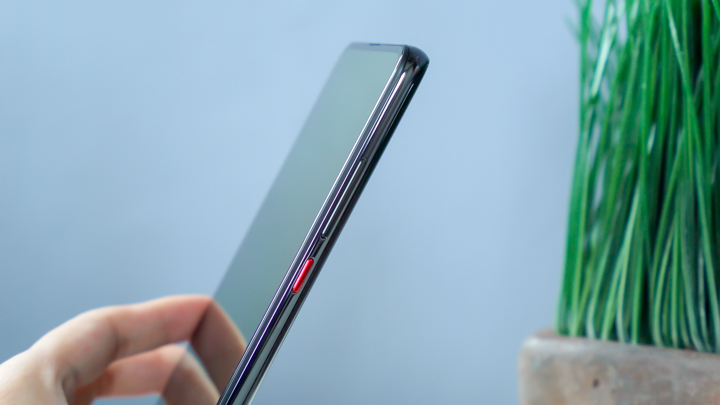
Other things we lack are honestly just flagship-grade features, such as wireless charging and water and dust resistance — which I can forgive simply because of the Mi 9T Pro’s mid-range price point. So yeah, for design, Mi 9T Pro — it’s pretty, it’s functional, it’s nothing we haven’t seen before, but it’s good.
For the screen, we get a 6.39-inch Super AMOLED panel with a resolution of 2340 x 1080. It’s nice and sharp, it’s bright, colors are amazing, blacks are deep, and it supports HDR content, which is a nice little flagship feature.

The OLED-based panel also means you get an always-on display and for protection, you get Gorilla Glass 5 which is nice. There’s no screen protector pre-installed so you’ll have to buy one somewhere else.
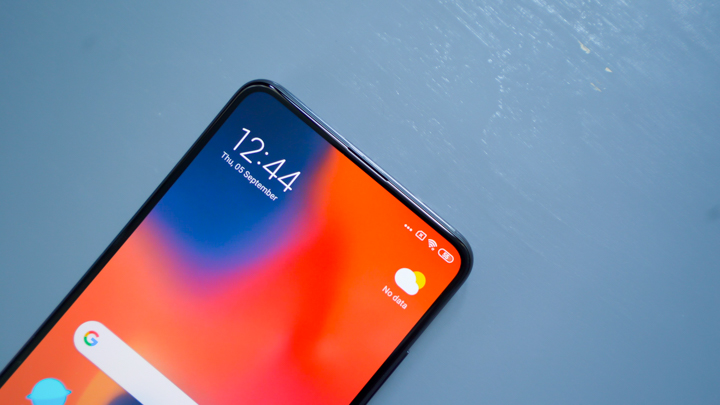
Checking out audio real quick, the down-firing speaker is pretty loud, it has clear mids and slightly less clear highs, but the bass is lacking a lot. I guess it’s okay to use for listening to music, but as with any phone with down-firing speakers, it’s easy to cover it up with your hand when watching videos.
Let’s get to the cameras. So for the rear, we get a 48MP Sony IMX586 primary camera, 8MP telephoto camera, and a 13MP ultrawide camera. The pop-up selfie camera is a 20MP sensor.

For the most part, just like the K20 Pro, photo quality is good under bright natural lighting, and shots are comparable to the Mi 9’s, though still inferior. Stay tuned for our full comparison between the two. The shots tend to be on the softer side, with more muted natural colors, which makes it useful if you’re fond of editing your photos before posting.
You can get an incredible amount of detail with the 48MP mode, though note that you cannot zoom in when you’re using it. It also works great for night photos, since the pixels are bigger, you don’t generate as much noise. If you do want to zoom in for night situations though, there is a dedicated night mode that supports the telephoto lens. It brightens up the scene a lot and increases the dynamic range seen in the image, but it’s not perfect. As you can see in the glow of the lights in the distance, there is quite a bit of noise and haziness.
There’s a lot of flexibility to be had in shooting situations because you have three different focal lengths I like that the ultrawide camera’s quality though isn’t too far off from the primary sensor. You get a lot of dynamic range for those beautiful landscape shots and color is about the same. Though I will say that the telephoto camera isn’t that particularly useful as you only get up to 2x zoom. It is, however, the sensor used for portrait mode, so as long as you have a lot of distance between your subject and background, you get a very pleasant bokeh effect and an appropriate look for portrait shots.
For the pop-up selfie camera, you get nice detailed selfies with right skin tones. The beauty mode is decent at smoothing out blemishes without looking too unnatural, but I mean you still know that something’s been going on. And in portrait mode, subject-background separation is good, though at times it’s not perfect.
For videos, you can shoot up to 4K at 60fps. Quality is impressive with sharp detail and good colors, just like with the still photos, and electronic image stabilization is present. You also have slow-motion and time-lapse available if you want to use them.
So final verdict for the cameras — they’re pretty decent, especially for this price range.
We get MIUI 10.3.1 on top of Android 9 Pie. Only this time we have the Global ROM, which is better if you need Google Play services. Apps like Gmail, Chrome, YouTube, Play Store, Photos, Drive, etc., are all here. Xiaomi’s apps are also here like its browser, SMS app, calendar, notes, and security suite.

When it comes to pre-installed apps, there’s Lazada, Facebook, WPS Office, Netflix, AliExpress, and Opera browser. Apps tailored for the Chinese market are no longer here, but MIUI features like Second Space, Dual apps, App lock, and Themes are still here.

As usual, MIUI is pleasant to look at and easy to navigate, thanks to its simple user interface. Right now, we’re excited for Android 10 as the Redmi K20 Pro is already receiving it.
Powering the Mi 9T Pro, of course, is a Snapdragon 855 chipset with an Adreno 640 GPU. For the memory configuration, it can go up to 8GB of RAM, and up to 256GB of internal storage. Our unit here has 6GB of RAM and 128GB UFS 2.1. Nonetheless, even if we don’t have the maximum possible RAM for this device, performance is impressive! The Snapdragon 855 is indeed one hell of a beast, I mean look at our benchmark scores.

So needless to say, anything you throw at it, heavy graphics games, multitasking, productivity, the Mi 9T Pro can handle it all. Looking at the benchmarks, we’re getting almost the same numbers as the K20 Pro, so there’s no significant difference in performance.
• AnTuTu – 364,767
• Geekbench – 2,965 (Single-core), 10,523 (Multi-core), 7,274 (RenderScript)
• 3D Mark – 5,150 (SSE – OpenGL ES 3.1), 4,546 (SSE – Vulkan)
• PC Mark – 9,280 (Work 2.0)
• AndroBench – 839.01 MB/s (Sequential Read), 194.14 MB/s (Sequential Write)
For connectivity, we have the same features as the Mi 9, and that includes dual-SIM with 4G LTE, WiFi, Bluetooth 5.0, and dual-band GPS. Everything works as advertised as calls are loud and clear, connects quickly to the internet, and gets a solid lock on our location.

Keeping it running is a 4,000mAh battery that lasts a long time. In PC Mark’s battery test, it lasted for 14 hours and 8 minutes, while in our video loop test, it lasted for 27 hours. And this does translate to actual usage. Like what we experienced with the K20 Pro, the battery life is solid on the Mi 9T pro and can definitely last for more than a day.

And charging is pretty fast as well. Using the 18W charger only takes 1 hour to get from 20% to 100%. You’ll want to get a 27W charger to cut down that charging time.
So, just like the with our experience with the K20 Pro, we were satisfied with the Mi 9T Pro’s design, performance, display, cameras, and battery. It’s even better now since it has a Global ROM with Google Play services, is officially available in the Philippines, so there’s a local warranty, is now available in four colors, and still affordable.
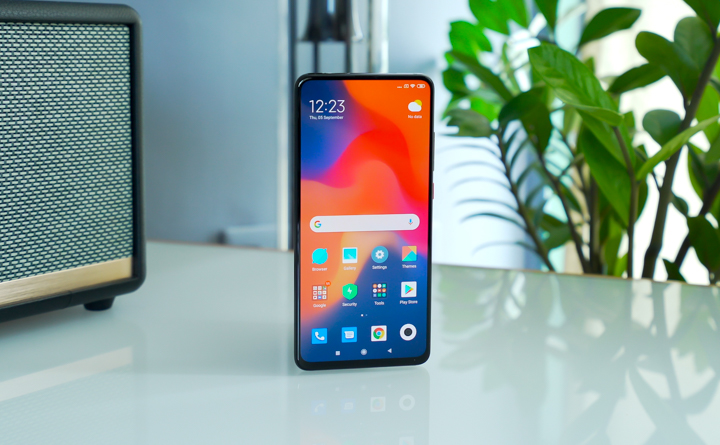
If your budget is just below PHP 19K, you can get the 6GB + 64GB model for PHP 18,990USD 324INR 27,433EUR 308CNY 2,357. And if you have a little over PHP 20K, there’s the 6GB + 128GB for PHP 20,490USD 349INR 29,600EUR 333CNY 2,543. There’s no 8GB + 256GB model yet, but we hope they offer it soon given the competitive price.
Xiaomi Mi 9T Pro specs:
6.39-inch FHD+ (2340 x 1080) Super AMOLED 19.5:9 display
Corning Gorilla Glass 5
Qualcomm Snapdragon 855 2.84 octa-core CPU
Adreno 640 GPU
6GB, 8GB RAM
64GB, 128GB, 256GB UFS 2.1
48MP Sony IMX586 F1.8 + 13MP F2.4 (ultrawide) + 8MP F2.4 (telephoto), rear cameras
20MP F2.2 front camera (elevating)
Dual-SIM
4G LTE
WiFi 802.11 a/b/g/n/ac
Bluetooth 5.0
GPS, A-GPS, GLONASS, BDS, GALILEO, QZSS
NFC
FM Radio
3.5mm audio port
USB 2.0 Type-C
Fingerprint scanner (in-screen)
MIUI 10 (Android 9.0 Pie) w/ Game Turbo 2.0
4,000mAh battery w/ 27W fast charging
156.7 x 74.3 x 8.8mm
191 g
What I liked:
• Attractive design
• Nice notch-less display
• Decent cameras
• Great performance
• Big battery capacity
• Competitive price
What I didn’t:
• No screen protector included
• Non-expandable storage
• Thick and hefty

YugaTech.com is the largest and longest-running technology site in the Philippines. Originally established in October 2002, the site was transformed into a full-fledged technology platform in 2005.
How to transfer, withdraw money from PayPal to GCash
Prices of Starlink satellite in the Philippines
Install Google GBox to Huawei smartphones
Pag-IBIG MP2 online application
How to check PhilHealth contributions online
How to find your SIM card serial number
Globe, PLDT, Converge, Sky: Unli fiber internet plans compared
10 biggest games in the Google Play Store
LTO periodic medical exam for 10-year licenses
Netflix codes to unlock hidden TV shows, movies
Apple, Asus, Cherry Mobile, Huawei, LG, Nokia, Oppo, Samsung, Sony, Vivo, Xiaomi, Lenovo, Infinix Mobile, Pocophone, Honor, iPhone, OnePlus, Tecno, Realme, HTC, Gionee, Kata, IQ00, Redmi, Razer, CloudFone, Motorola, Panasonic, TCL, Wiko
Best Android smartphones between PHP 20,000 - 25,000
Smartphones under PHP 10,000 in the Philippines
Smartphones under PHP 12K Philippines
Best smartphones for kids under PHP 7,000
Smartphones under PHP 15,000 in the Philippines
Best Android smartphones between PHP 15,000 - 20,000
Smartphones under PHP 20,000 in the Philippines
Most affordable 5G phones in the Philippines under PHP 20K
5G smartphones in the Philippines under PHP 16K
Smartphone pricelist Philippines 2024
Smartphone pricelist Philippines 2023
Smartphone pricelist Philippines 2022
Smartphone pricelist Philippines 2021
Smartphone pricelist Philippines 2020
xixiaaa says:
Ang risk lang dito yung ghost touch nila.
JDZ says:
mas ok ang Redmi 7A https://bit.ly/2k2U65n bumili kasi yung pinsan ko.. mas cheaper..
Edwin Areja says:
huawei nova 5t vs xiaomi mi 9T Pro dapat ang good comparison. huwag sa one plus 7 pro. Bago mag Sale sa Lazada gumawa na kayo ng comparison dahil cigurado madami bibili nito sa 9/9/19.
Barca11 says:
How about the speed and accuracy of in-display fingerprint scanner?
Jhan Mark Lumakin says:
Mi 9T pro vs K20 pro?
LIZ says:
THE HEADPHONE JACK ON TOP? THAT IS A YES FOR ME! BUT THIS WOULD HAVE BEEN THE PERFECT PHONE IF IT HAD EXPANDABLE STORAGE. ;'(
Nis says:
Bakit yung mi 9t pro hanggang h+ lng yung connection? kahit nasa city nmn ako na 4g na. Inuodate ko na rin apn h+ connection pa din